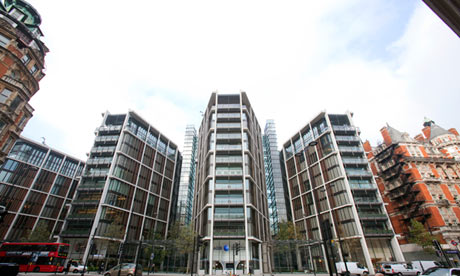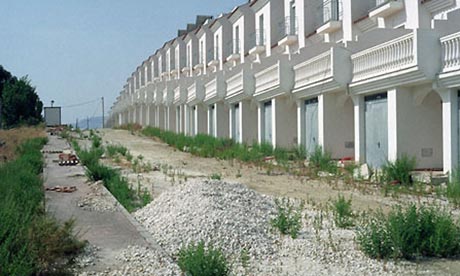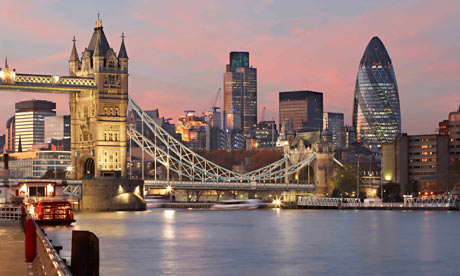470: UK property investment trends
05-11-2013
PropertyInvesting.net team
EU History: The European Union monetary experiment started with distorted low interest rates as Germany was battling to get out of a deflation spiral after the 1990s and re-unification. The monetary union gave southern European and peripheral countries access to huge quantities of cheap money in a strong currency back by Germany, and gave these oil importing countries a feeling of dynamic growth and new prosperity. North-west Europeans bought holiday homes, visited for holidays as cheap flights, new airports and low oil prices made these areas far more accessible. It really was the boom years up to 2005 for Greece, Spain and Ireland backed by a gigantic building-construction boom and EU subsidies. To its credit, politicians aspired to glue mainland Europe together in economic union after two world wars destroying the region this is  part of its background, to indirectly help achieve long-lasting peace after so many wars.
part of its background, to indirectly help achieve long-lasting peace after so many wars.
Distortion: The whole process reversed after the 2008 financial crisis. Firstly by then oil prices had risen from $10/bbl in 1999 to $145/bbl by July 2008 creating huge deficits. The property bubble went pop shortly after 2008. Then deficits skyrocketed followed by austerity measures that increase unemployment to about 25% overall and over 50% for the young. Oil prices stayed stubbornly high meaning oil import bills depressed growth and exacerbated a severe depression in Greece, Ireland and Spain. This time, interest rates have stayed too high ideal for Germany but not stimulative enough for Spain and Greece. The Greek and Spanish currency the Euro is far too strong to allow them to compete on level terms with Germany.
Striking Contrast: What this highlights is the big imbalances between the very efficient manufacturing export dominated German economy and the inefficient service oriented Greek and Spanish economies. Over time, the imbalances have increased particularly as Spain and Greece have such poor demographics their populations are declining and aging in most areas and fertility rates are only ~1.3 (instead of 2.1 required to keep a stable population).
Slow Decline: We really cannot see Greece and Spain ever achieving the type of growth experienced by the one off mirage boom cause by increasing debt, cheap oil, cheap money, strong currency give-aways, EU infra-structure grants and subsidies and construction boom-bubble economics. They really did have everything going for themselves during 1998 to 2005. Its hardly surprizing things are so bad now it was an accident waiting to happen.
Avoid Southern Europe: So our advice is even though property in Spain a nd Greece may look tempting, dont risk your money because things are likely to get even worse. As governments get desperate, they tend to start taxing more, and property is an easy target. Furthermore if either country leaves the Euro, the currency will lose half of its value. So if you have an apartment valued at Euro 200,000, it will then only be worth Euro 100,000 in the new currency. Another example is Spain will shortly make it very difficult to rent out villas they want to dissuade tourists from renting villas because they get less tourist revenue and jobs compared with when people stay in hotels. These new regulations will further depress holiday property values. In Spain, if a squatter enters your property, after two days they can stay for about 3 years without being convicted. If you miss just one monthly payment, the bank can seize your property. So if you buy a villa and live abroad, you have very little legal protection from either banks, squatters or the government. And a Euro exit would mean your property value halving. No wonder so many international investors are investing in UK property instead.
nd Greece may look tempting, dont risk your money because things are likely to get even worse. As governments get desperate, they tend to start taxing more, and property is an easy target. Furthermore if either country leaves the Euro, the currency will lose half of its value. So if you have an apartment valued at Euro 200,000, it will then only be worth Euro 100,000 in the new currency. Another example is Spain will shortly make it very difficult to rent out villas they want to dissuade tourists from renting villas because they get less tourist revenue and jobs compared with when people stay in hotels. These new regulations will further depress holiday property values. In Spain, if a squatter enters your property, after two days they can stay for about 3 years without being convicted. If you miss just one monthly payment, the bank can seize your property. So if you buy a villa and live abroad, you have very little legal protection from either banks, squatters or the government. And a Euro exit would mean your property value halving. No wonder so many international investors are investing in UK property instead.
UK Monetary Control: So lets take a look at the UK by comparison. Firstly, it has its own independent Central Bank that sets its own interest rates and can print its own currency. It can control monetary policy depending on how the economy is performing. It can debase or increase the value of the currency with these measures and control inflation.
UK Favourite: The UK is an English speaking country with global links, London is the preeminent financial centre of the world and the country is remarkable free with low crime, particularly gun crime. Almost no-one has a gun. People therefore feel safe walking in the cities and countryside something absolutely amazing by comparison if you have ever lived in the USA or South Africa.
Huge UK Deficit: The UK has a large deficit something like 7% - but it is able t o print money to pay for this deficit spending. Okay, because of this the currency is weak but it does support some form of debt based growth albeit this is not of course economically very healthy. The UK has about the highest private sector debt in the world mainly from banks and people with large mortgages. This is indeed a drag on the economy its also why the Bank of England seems keen to inflate the debt away by printing more money. Eventually this will end in tears because the bond market bubble will go pop but for now its staying in-tact and its difficult to judge when this bond market will pop. It might need a Labour government in power to precipitate or trigger this collapse once markets are suitably spooked and lose confidence.
o print money to pay for this deficit spending. Okay, because of this the currency is weak but it does support some form of debt based growth albeit this is not of course economically very healthy. The UK has about the highest private sector debt in the world mainly from banks and people with large mortgages. This is indeed a drag on the economy its also why the Bank of England seems keen to inflate the debt away by printing more money. Eventually this will end in tears because the bond market bubble will go pop but for now its staying in-tact and its difficult to judge when this bond market will pop. It might need a Labour government in power to precipitate or trigger this collapse once markets are suitably spooked and lose confidence.
Foreign Inward Investment: One of the things keeping the UK going is the huge inflows of foreign cash these super rich foreigners from all corners of the planet choose to invest in prime London property as a safe haven - because of tax advantages, low Sterling value, good legal title, low risk of taxes or seizure and low crime. If you have a billion then London is also a superb place to live of course. It has about the fourth most millionaires and billionaires in any city in the world even though its population is only 8 million. Its a playground for the rich hedge funds, investments, financial vehicles, private equity, new companies and venture capital all on ones door-step. So these super-rich can easily visit or get visited by investors and wealth managers and easily enjoy themselves with tourist attractions, shops and leisure facilities. Because there are so many interesting things to do day and night in London, its less important that the weather is often rather miserable.
Paper Bugs Winning in 2013: In the last few months, the gold and silver prices have been sm acked down and stock prices have rallied as governments have continued their policy of printing money and the general perception is that the US, UK and parts of Europe are on a road to recovery. The paper bugs are winning. But we think this is temporary though its difficult to say for sure. The western world is due for another recession. Whats helping are the floods of cheap gas and oil from the US oil and gas shale boom which is keeping a lid on oil prices and this further stimulates economies. But the deficits, private and government debts are just so colossal that the only way out for governments is to print their currencies into oblivion through inflation. If real deflation started, countries could never pay back their debts. So Central Banks will do whatever it takes to create inflation inflate the economy to create an illusion of growth but meanwhile real spending power will decline and everything will become more expensive. The current game is to try and stimulate another house price mini-boom in both the USA and UK governments know that a house price crash will lead to depression. But booms are of course highly destructive as well. They are trying to tread a fine line, but it will likely end in tears one day it may take a few more years yet.
acked down and stock prices have rallied as governments have continued their policy of printing money and the general perception is that the US, UK and parts of Europe are on a road to recovery. The paper bugs are winning. But we think this is temporary though its difficult to say for sure. The western world is due for another recession. Whats helping are the floods of cheap gas and oil from the US oil and gas shale boom which is keeping a lid on oil prices and this further stimulates economies. But the deficits, private and government debts are just so colossal that the only way out for governments is to print their currencies into oblivion through inflation. If real deflation started, countries could never pay back their debts. So Central Banks will do whatever it takes to create inflation inflate the economy to create an illusion of growth but meanwhile real spending power will decline and everything will become more expensive. The current game is to try and stimulate another house price mini-boom in both the USA and UK governments know that a house price crash will lead to depression. But booms are of course highly destructive as well. They are trying to tread a fine line, but it will likely end in tears one day it may take a few more years yet.
Bond Market Will Pop: A lot rests on the bond markets which is just about the biggest bubble in the history of the financial world. Bond rates at 0.5% are clearly ridiculous the market has been distorted by Central Banks buying back their own bonds with printed money simply because they have been able to keep rates so low for so long. But this will end eventually when the inflation gene gets out of the bottle. Governments will never be able to afford interest payments on bonds if rates double it all looks very stable with interest rates far too low at this time. But in reality, its just like the top of the property market. Its a bubble and it will go pop one day releasing a tidal wave of dollars and pounds that will flood in and drive asset prices skyward once everyone bails out of bonds in unison. Further printing of money would only make matters worse. Whether the bond market bubble will pop in 2013 or a few years later no-one really knows, but eventually there will be a massive correction that will lead to the next severe financial crisis something even more severe than in 2008.
it all looks very stable with interest rates far too low at this time. But in reality, its just like the top of the property market. Its a bubble and it will go pop one day releasing a tidal wave of dollars and pounds that will flood in and drive asset prices skyward once everyone bails out of bonds in unison. Further printing of money would only make matters worse. Whether the bond market bubble will pop in 2013 or a few years later no-one really knows, but eventually there will be a massive correction that will lead to the next severe financial crisis something even more severe than in 2008.
Depression: Its been 5 years since the last severe recession. In reality most western countries have been in a depression since then. Certainly all areas outside southern England (plus Aberdeen) and away from regional capitals have been in depression in the UK since 2008. The reason why we say this is that the claimed inflation numbers are far from reality. Real inflation is more like 6% (instead of 2.5%) and hence GDP growth is more like -2% (rather than the claimed +1.5%, once the real inflation numbers are taken into consideration). If Spain and Greece claim they have not suffered a depression then how come their youth unemployment is 55% and overall unemployment is 25%?
London Boom: One of the outcomes of this depression is increasing migration of young people to the cities and in particular to London to find work. This has helped keen wage inflation low because many of these workers are semi-skilled. The population of London in particular is booming with an increase of 800,000  people in the last ten years and a further 800,000 people expected in the next ten years. Because London home building is so minimal, there has been an increasingly short supply of properties for rent particularly affordable homes - which has driven up rental prices about 20% in the last two years. Its likely this trend will continue as long as there is not a big dip in the economy of London. The overcrowding on the transport system in London has massively increased in the last five years as has overcrowding in homes/accommodation though its difficult for the anyone to do anything about this short term - because of lack of supply (rail links and housing). Expect this trend to continue.
people in the last ten years and a further 800,000 people expected in the next ten years. Because London home building is so minimal, there has been an increasingly short supply of properties for rent particularly affordable homes - which has driven up rental prices about 20% in the last two years. Its likely this trend will continue as long as there is not a big dip in the economy of London. The overcrowding on the transport system in London has massively increased in the last five years as has overcrowding in homes/accommodation though its difficult for the anyone to do anything about this short term - because of lack of supply (rail links and housing). Expect this trend to continue.
Reluctance to Invest Printed Money: Because investors know the economy is in pretty bad shape and most peoples living standards are generally declining being eaten away by inflation there is a particular reluctance to invest in retail, housing or infra-structure in the UK. The billions of printed money are being used to re-balance banks balance sheets rather than lending to businesses and private individual. The cheap money moves into stocks and shares which increases the net worth of the top 5-10%. Businesses are in any case very reluctant to lend more because the outlook looks very uncertain and in many respects look rather bleak. The money is being hoarded by the super-rich and bankers. So we expect this to lead to further supply side problems hence the supply of housing and oil, gas within the UK will be constrained and the deficit will not decrease markedly despite the decline the pound. Its really a steady drift downwards for most parts of the UK with London and the SE being the only regions to show significant real growth.
Southern Prosperity: For investors, we continue to believe towns and cities in southern England close to London offer the safest bet with London showing the most lively performance. Its  possible Manchester and Leeds with their large commercial centres could also do well, but there will be a continued shift of wealth from areas that boomed during the Labour years namely the north and rural areas with high public sector jobs growth, to areas with higher private sector jobs growth and reducing public sector jobs growth to the south of England. Because of these strains in the UK economy, the best performing areas will be cities where jobs are created. Rural areas like mid-Wales, less attractive parts of Cornwall, Cumbria and NE England will continue their depression as retail premised go broke, smaller industries close down and agriculture struggles. These areas, many showing significant depopulation and flight of young people, will see continued public sector jobs losses and manufacturing decline.
possible Manchester and Leeds with their large commercial centres could also do well, but there will be a continued shift of wealth from areas that boomed during the Labour years namely the north and rural areas with high public sector jobs growth, to areas with higher private sector jobs growth and reducing public sector jobs growth to the south of England. Because of these strains in the UK economy, the best performing areas will be cities where jobs are created. Rural areas like mid-Wales, less attractive parts of Cornwall, Cumbria and NE England will continue their depression as retail premised go broke, smaller industries close down and agriculture struggles. These areas, many showing significant depopulation and flight of young people, will see continued public sector jobs losses and manufacturing decline.
The strongest growing areas are likely to be:
London (Shoreditch of Tech City is the highlight)
Cambridge
Bristol
Aberdeen (oil and gas engineering as long as oil prices stay >$70/bbl)
Southampton
Brighton
Possibly Manchester and Leeds
Avoid Peripheral Areas: These will have vibrant young diverse private sector jobs and populations. The declining rural areas will have the aging, retiring, least vibrant economies with declining populations.
We hope this Special Report has help frame your ideas for property investment in the UK and internationally and explain which SE England remains a firm favourite for so many wealthy property investors. If you have any comments or queries, please contact us on enquiries@propertyinvesting.net

